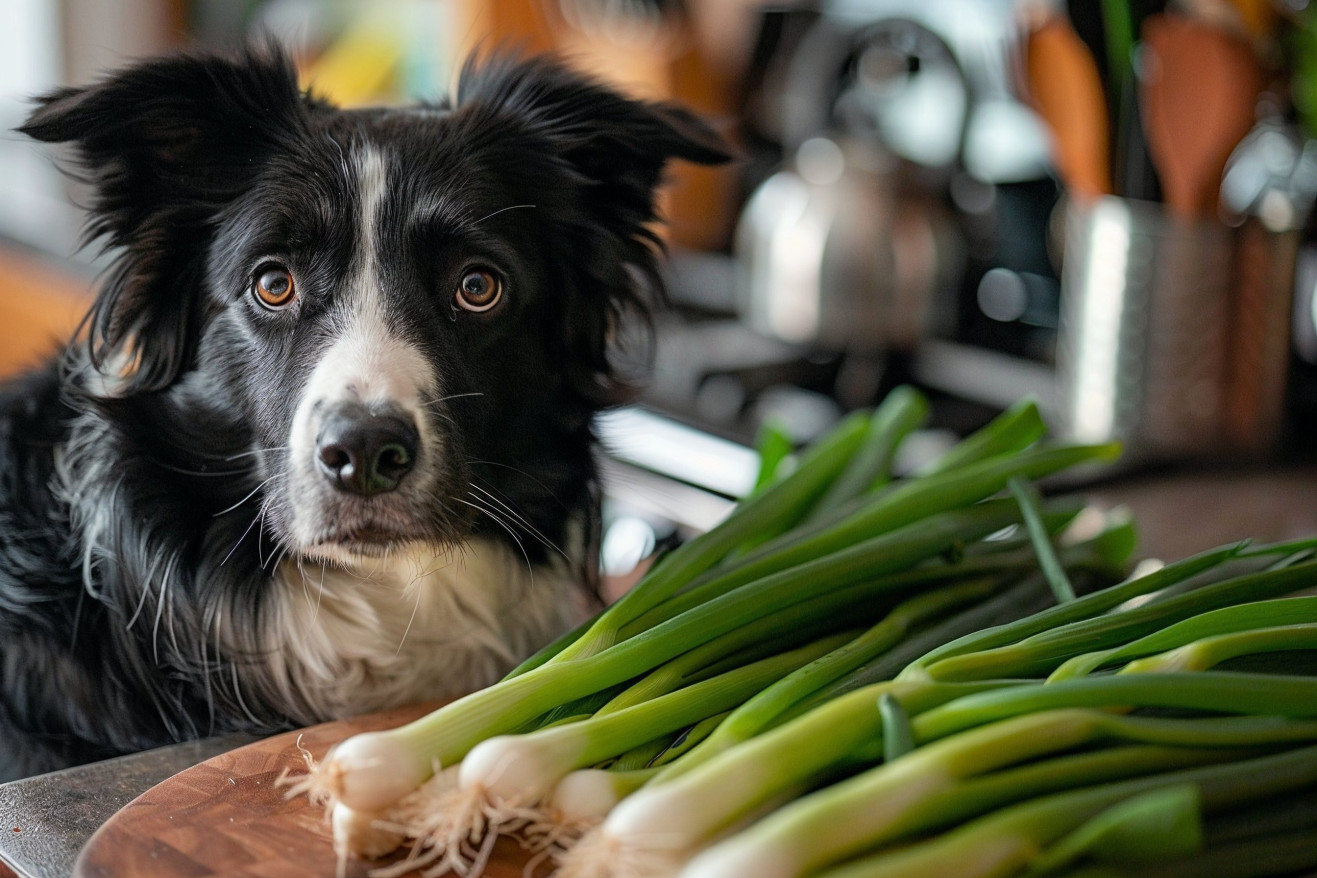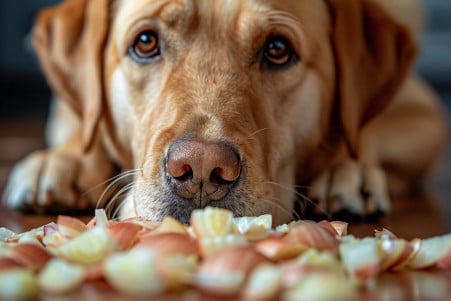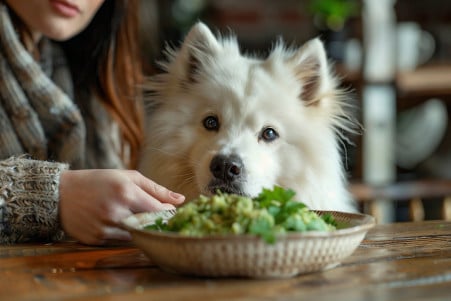Can Dogs Eat Scallions? Unpacking the Risks of Allium Toxicity in Dogs
13 March 2024 • Updated 12 March 2024

Scallions are a delicious way to add some zest to our favorite dishes, but can our furry friends enjoy them too? Unfortunately, scallions are not safe for dogs to eat. Like other members of the Allium family, scallions contain compounds that can lead to the destruction of red blood cells and anemia in dogs.
Signs of toxicity can include vomiting, weakness, and even collapse. Dogs who have ingested scallions will need to be seen by a vet immediately.
This article will take a deep dive into veterinary research and toxicology studies to provide a comprehensive look at the risks scallions pose to dogs. This will include an examination of the toxic components of scallions, how they affect a dog’s body, and what the appropriate treatment is for dogs who have ingested them.
By the end of this article, you will have the information you need to keep your dog safe and know what to do if they accidentally eat scallions.
Can dogs eat scallions?
How Allium Toxicity Works in Dogs
Scallions, as well as other Allium species, are rich in organosulfides or organosulfoxides. When dogs ingest these plants, these compounds are metabolized into a variety of sulfur-containing molecules, which results in oxidative damage to red blood cells. According to the Merck Veterinary Manual, the primary toxic mechanism is oxidative hemolysis, which is when a dog’s red blood cells are destroyed faster than they can be replaced.
Hemolytic anemia, which is caused by Allium toxicity, can cause clinical symptoms such as vomiting, weakness, abdominal pain, and diarrhea. In more extreme cases, dogs can also experience hemoglobinuria, icterus, tachypnea, and tachycardia, according to a study published in PMC.
The time it takes for these symptoms to appear and their severity depend on the dose of Allium ingested, the size of the dog, and the dog’s breed-specific sensitivity to the toxin, as noted in DVM360.
It’s important to note that even small doses of scallions can cause toxicity and have long-term effects on a dog’s health. Getting a dog to a veterinarian as soon as possible is important for managing the symptoms and preventing further issues. Expert opinions also help to expand the knowledge about Allium toxicity and offer more information about the risks of feeding scallions to dogs.
What Vets Say About the Dangers of Scallions to Dogs
Veterinary professionals are in complete agreement about the dangers of scallions to dogs. VCA Animal Hospitals states that all Allium species, including scallions, are toxic to dogs, causing gastrointestinal upset and damage to red blood cells. This means that no amount of scallions is safe for dogs to eat, as even small amounts can cause symptoms that range from vomiting and diarrhea to anemia and kidney damage.
To drive this point home, Purina, citing information from The American Kennel Club, explains that it’s the compound N-propyl disulphide in scallions that causes the problem by destroying red blood cells in dogs. This can result in anemia, which can be fatal, and the severity of the dog’s reaction is based on the dog’s size and the amount of scallions they eat.
In light of this information, the veterinary community is in agreement that dogs who have ingested scallions need to be seen by a vet immediately. While there is consensus about the dangers of scallions, there is also agreement about the vulnerability of certain breeds, with VCA Animal Hospitals pointing out that Japanese breeds, including Akitas and Shiba Inus, are especially at risk.
This information is important because it shows how important it is for dog owners to be aware of the risks and to take steps to prevent their dogs from being exposed to scallions.
How to Identify and Treat Scallion Toxicity in Dogs
Dogs that have eaten scallions may show signs of toxicity right away, including vomiting, diarrhea, abdominal pain, and lethargy. Dogs may also have a loss of appetite and be dehydrated, according to PDSA. In more severe cases, symptoms can progress to include difficulty breathing, increased heart and respiratory rates due to anemia, and even seizures.
If you think your dog has eaten scallions, PetMD warns against trying to make your dog vomit at home and instead recommends taking them to the vet immediately.
According to the Pet Poison Helpline, treatment for scallion toxicity usually starts with making the dog vomit and giving them activated charcoal to prevent the toxin from being absorbed. Dogs will also be given IV fluids and their blood will be monitored for things like packed cell volume (PCV) to see how severe the anemia is and if a blood transfusion is necessary.
The prognosis for dogs that have eaten scallions is usually good as long as they get treatment quickly. However, according to PDSA, the outcome will depend on the amount of scallions the dog has eaten and how quickly they get treatment.
While severe long-term issues and death are rare, a dog’s quality of life can be seriously impacted if they don’t get help right away. This is why it’s so important for dog owners to get their pet help as soon as they suspect they’ve eaten scallions.
Breed Sensitivity to Allium Toxicity in Dogs
Although all dogs are susceptible to Allium toxicity, there are certain breeds that may be at a higher risk. A paper posted on ResearchGate even suggests that there may be a breed predisposition to toxicosis from Allium plants, including onions.
It specifically notes that Japanese dog breeds like Akitas and Shiba Inus are more sensitive to the toxic effects of these plants, according to the Neumeister Animal Hospital. This sensitivity may be due to genetic factors that affect how the body metabolizes toxins.
That said, the general toxicity levels are the same for all dogs, and the most common breeds that have been reported to suffer from Allium toxicity are mixed breeds, German Shepherds, and Rottweilers.
The Neumeister Animal Hospital also notes that even small amounts of Alliums that exceed 0.5% of a dog’s body weight can lead to toxicity. This means that while there may be some breeds that are more sensitive to Alliums, all dog owners need to be careful.
In order to take the most effective preventive measures and ensure the health and safety of their dogs, it’s important for dog owners to be aware of the differences in breed sensitivity to Allium toxicity. This way, they can be on the lookout for signs of Allium poisoning in their dogs, regardless of their breed, and get them to a vet as soon as possible if they suspect their dog has ingested these plants.
Improving Canine Food Safety Standards: The Case of Scallions
Despite their popularity in human cooking, the danger that scallions pose to dogs is not well-known among pet owners. A large number of pet poisoning cases, as one PubMed review notes, can be traced back to a lack of public knowledge about the real and serious risks that certain human foods, like scallions, pose to dogs and cats.
This knowledge gap has led to accidental poisonings from foods like scallions, which are part of the Allium family and are poisonous to dogs.
The effectiveness of public education campaigns to inform pet owners about the dangers of feeding scallions to dogs has been mixed. However, potential ways to increase public knowledge include educational campaigns in veterinary clinics, social media messaging, and the inclusion of pet safety information on human and pet food labels.
By getting ahead of the issue and sharing information, including the specific risks of Allium species toxicity outlined in PMC, organizations and pet advocates can help reduce the number of accidental poisonings of dogs.
As we continue to celebrate the human-dog relationship, it’s important that pet owners are informed about dietary dangers like scallions. Better education can help prevent health emergencies and ensure the safety of our four-legged friends.
Final Thoughts: Scallions and Your Dog’s Well-Being
To sum up, scallions are not safe for dogs. The research is conclusive: these members of the Allium family contain a toxicological hazard due to their organosulfur compounds that can cause oxidative damage to red blood cells, leading to anemia and other health problems. VCA Animal Hospitals have also confirmed the danger that scallions present to dogs, noting that no amount is safe.
It’s important for dog owners to be on the lookout and make sure that they don’t feed their dogs scallions and that they watch for signs of accidental consumption. If a dog does eat scallions, it’s important to get them to a vet right away to help reduce the toxicity and help them recover.
We hope that all dog owners will take the responsibility of protecting their dogs’ health to heart. By being aware and prepared, you can help prevent scallion toxicity. Your quick thinking and action can help ensure that your furry friend stays healthy and safe from the dangers of some of the most seemingly innocent human foods.


